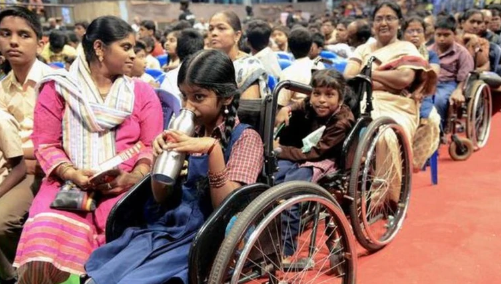43% Children with Disabilities May Drop Out Due to Hurdles Faced in Online Education: Survey

Representational Image. Image Courtesy: India Today
New Delhi: About 43% of children with disabilities are planning to drop out of studies due to difficulties faced by them in online education, according to a survey conducted with 3,627 respondents.
The survey was conducted by Swabhiman, a community-based organisation working for the rights of persons with disability, in Odisha, Jharkhand, Madhya Pradesh, Tripura, Chennai, Sikkim, Nagaland, Haryana and Jammu and Kashmir in May.
A total of 3,627 people, including students, parents and teachers, participated in the survey.
According to the survey, 56.5% children with disabilities were struggling yet attending classes irregularly, while 77% students said they would not be able to cope and would fall behind in learning due to their inability to access distance learning methods.
The survey found that 56.48% students are continuing their study, while the rest 43.52% are planning to drop out.
Thirty-nine per cent visually impaired students were unable to understand lessons with many students talking simultaneously, it said.
About 44% children with disabilities complained that no sign language interpreters were present in the webinars, the survey said.
The parents of 86% children with disabilities (CwD) said they did not know how to use technology and around 81% teachers said they did not have accessible educational material with them.
"The teachers also reported that 64% of students (CwD) did not have smartphones or computers at home. As many as 67% students (CwD) said they needed tabs or computers or comparable devices for online education," the survey said.
Seventy-four per cent of children with disabilities said they needed data/Wi-fi support for educational purposes while 61% expressed a need for scribes, escorts, readers and attendants, it said.
A report based on the survey made detailed recommendations to policy changes and revisions required "in the new normal" in times of the COVID-19 pandemic.
"Creating curricula which are suitable for different forms of disability is a non-negotiable and the starting point for any education for the children with disability," the report said.
"Policy changes are required to ensure that children are supported by suitable curricula in alternate formats suitable for them, and have the hardware and data to make online learning feasible. At the same time, an investment in special educators and parents to adapt to the changed environment is necessary so that they can support children with disabilities better," it said.
The report also recommended that education budgets should be suitably amended.
"At the same time, there is a need to explore alternative mediums such as community radio and television for education. Since children with disabilities relied on mid-day meals for their nutritional well-being, it is important that they continue to get this support," it said.
Swabhiman founder and chief executive Sruti Mohapatra said all children with disabilities cannot be clubbed as one group as they are persons with different disabilities and therefore different needs.
"The current pandemic has the potential of leaving students with disabilities behind. If adequate measures are not taken urgently, they are likely to suffer irrecoverable losses in their quest for education and a life of dignity," she said.
"Alternate course material must cater to different disabilities. Our recommendations include empowering students, teachers and parents so that they can play their roles more effectively," Mohapatra added.
The lockdown induced by COVID-19 in March prompted schools and colleges to move to the virtual world for teaching and learning activities. But weak internet penetration has turned e-education into a distant dream for many children.
Get the latest reports & analysis with people's perspective on Protests, movements & deep analytical videos, discussions of the current affairs in your Telegram app. Subscribe to NewsClick's Telegram channel & get Real-Time updates on stories, as they get published on our website.
























